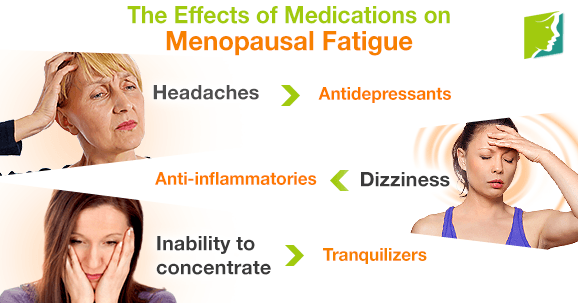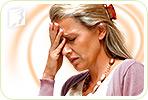Fatigue is so much more than the desire to sleep, it is a condition that can affect every avenue of a person's life, including their personal well-being and their professional and personal relationships. Characterized by lack of energy, inability to concentrate, irritability, and extreme tiredness, fatigue is common during menopause due to the onset of other menopause symptoms, such as mood swings, night sweats, and anxiety. Many women use medications to deal with their symptoms as well as other, unrelated conditions, though many are unaware of how these might affect their fatigue.
Antidepressants
Antidepressants are prescribed to treat depression by rebalancing the chemicals in the brain. While effective for this purpose, these may cause various side effects, including headaches and insomnia. However, these effects are normally temporary with continued use of medication.
Anti-inflammatories
Anti-inflammatory drugs are most commonly used for swelling and pain relief. There are a number of side effects associated with taking anti-inflammatory medication, which vary from person to person. Nausea, headaches, dizziness, weakness, and stomach pain could intensify the physical exhaustion of menopausal fatigue and can increase difficulty sleeping.
Tranquilizers
Tranquilizers are used to relieve anxiety, fear, and tension. The most commonly prescribed tranquilizer, diazepam, has an inhibiting effect on psychomotor performance and there is no evidence to suggest a tolerance can be built against these effects with continued use. This can intensify the cognitive effects of menopausal fatigue, such as inability to concentrate and reduced attention span.
Natural Therapies for Menopausal Fatigue
Consuming dietary triggers - such as alcohol, caffeine, and spicy foods - within two hours of going to bed will affect the depth of your sleep, meaning that even if you sleep for eight hours, you'll most likely still feel tired the following day. Cut down on these, especially in the evening, to promote restful, rejuvenating sleep. Stress is one of the main contributors to fatigue; anxiety can cause insomnia and other sleep disturbances. Make time to relax in the evening to partake in yoga, meditation, reading a book, or taking a hot bath.
During the day, dehydration is a contributing factor to fatigue. Drinking at least 2 L of fluids per day will ensure you remain hydrated and help keep your energy levels up. Try to also consume more iron - found in red meat, fish, nuts, and legumes - because fatigue is sometimes symptomatic of an iron deficiency. Iron carries oxygen in the bloodstream to improve cellular function, which maximizes mental alertness and muscle performance.
It's always a good idea to try natural therapies before opting for medications, because these tend to be focused on righting imbalances in the body, which means they rarely have any adverse effects on your lifestyle. However, medications are sometimes necessary; when using medications to treat a menopause symptom or an unrelated condition, it's important to read the label carefully or ask your doctor about possible side effects before taking it to avoid inadvertently affecting other aspects of your health.
Sources
- Better Health Channel. (2013). Fatigue fighting tips. Retrieved May 7, 2014, from http://www.betterhealth.vic.gov.au/bhcv2/bhcarticles.nsf/pages/Fatigue_fighting_tips
- Food and Drug Administration. (2007). Medication Guide for Non-Steroidal Anti-Inflammatory Drugs (NSAIDs). Retrieved May 7, 2014, from http://www.fda.gov/downloads/drugs/drugsafety/ucm089162.pdf
- National Health Service UK. (2013). Self-help tips to fight fatigue. Retrieved May 7, 2014, from http://www.nhs.uk/Livewell/tiredness-and-fatigue/Pages/self-help-energy-tips.aspx
- National Institutes of Health. (2014). Antidepressants. Retrieved May 7, 2014, from http://www.nlm.nih.gov/medlineplus/antidepressants.html
- National Institutes of Health. (2013). Fatigue: MedlinePlus Medical Encyclopedia. Retrieved May 7, 2014, from http://www.nlm.nih.gov/medlineplus/ency/article/003088.htm
- Office of Women's Health. (2010). Menopause and mental health. Retrieved May 7, 2014, from http://womenshealth.gov/menopause/menopause-mental-health/
- Smiley, A. (1987). Effects of minor tranquilizers and antidepressants on psychomotor performance. The Journal of Clinical Psychiatry, 48 Suppl, 22-28. Retrieved May 7, 2014, from http://www.ncbi.nlm.nih.gov/pubmed/2891686




